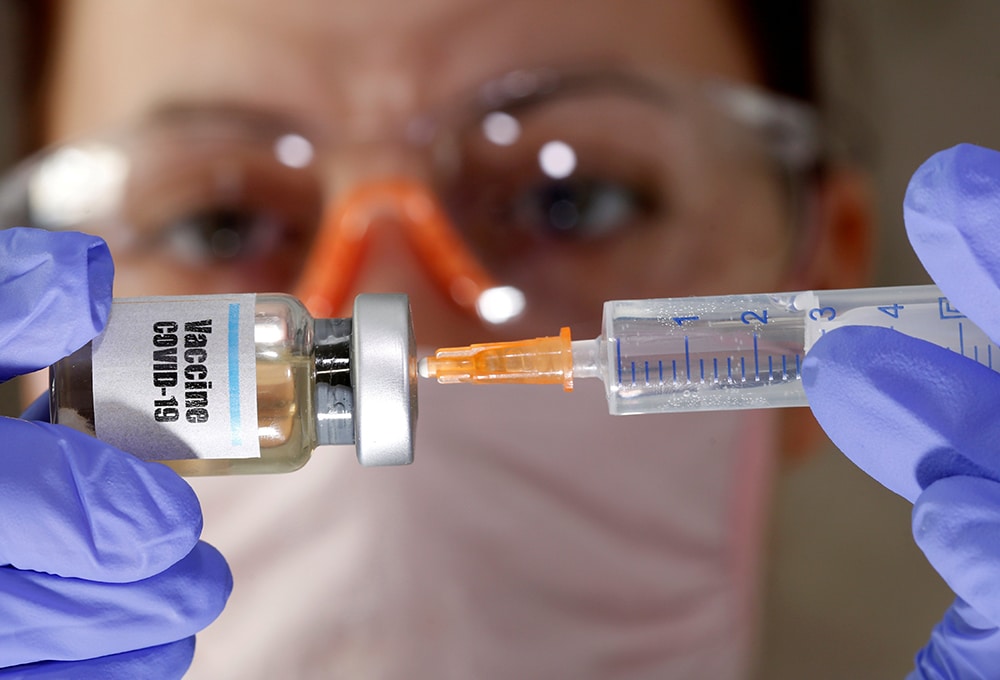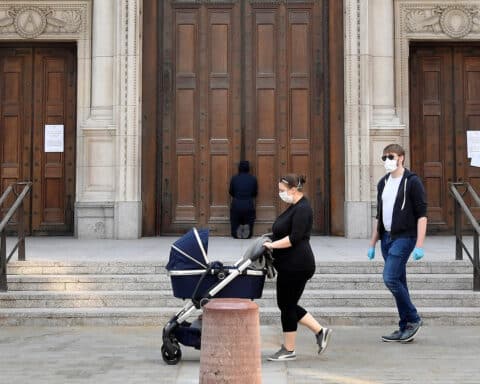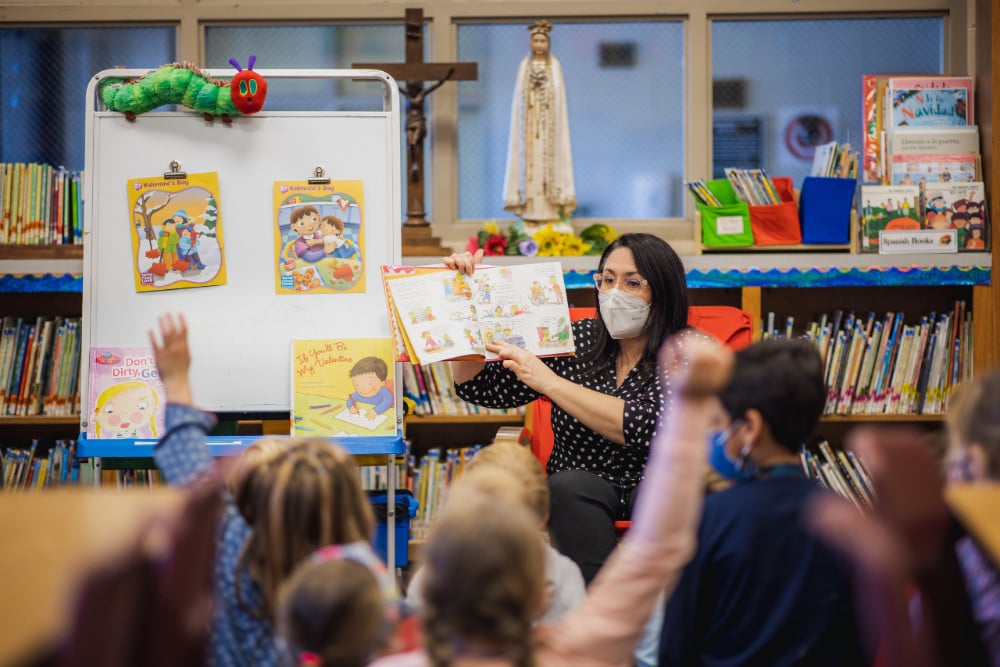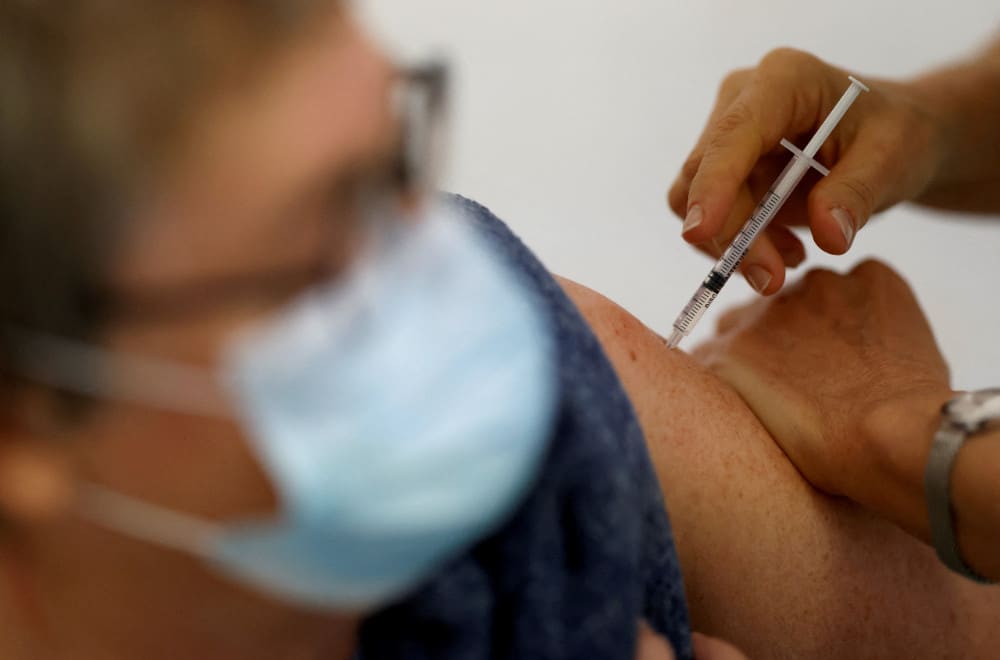This time last year, when we flipped the calendar from 2020 to 2021, many glasses were raised to toast what we all hoped would be a better year ahead. 2020 was so difficult for so many. Too many of us saw sickness and death up close as we mourned the loss of 350,000 people in the United States who had died from COVID-19 — mothers and fathers, sisters and brothers, grandparents, aunts, uncles, friends and so many more.
We sheltered in place and longed for the physical closeness that we had previously taken for granted. Our beloved Masses were canceled in order to protect ourselves and our neighbors, especially our elderly brothers and sisters and others who were significantly vulnerable to the virus. We masked up, washed our hands and socially distanced, hoping that these small sacrifices might help to flatten the curve and ease the overwhelming burden that had been placed on our health care workers — the doctors and nurses and others who Pope Francis called “the unsung heroes of this pandemic.”
Aside from masking and washing and distancing, there was little we could do other than pray that God would lead us out of the darkness. Even amid our suffering, we can be confident that he hears our cries, as Scripture assures us. “When you call me, and come and pray to me, I will listen to you” (Jer 29:12-13). In the Gospel of Matthew, Jesus himself says, “Ask and it will be given to you; seek and you will find; knock and the door will be opened to you” (7:7-8).
In the twilight days of 2020, that door was opened. After months of research and trials, scientists and medical researchers produced a number of vaccines that were approved for emergency use by the public, and on Dec. 11, 2020, the vaccine rollout began — a stunning, unprecedented success by the scientific community.
Ten days after the first doses were given in the United States, on Dec. 21, 2020, the Vatican’s Congregation for the Doctrine of the Faith attempted to put to rest growing concerns over the use of fetal stem cells in the development of the vaccines, ruling not only that the use of the approved vaccines was “morally licit” but that “the morality of vaccination depends not only on the duty to protect one’s own health, but also on the duty to pursue the common good.” Pope Francis and the U.S. bishops called receiving the vaccine “an act of love.”
With vaccination medically and morally approved, it seemed likely that COVID-19 would largely be snuffed out in 2021. Optimism abounded, and by mid-April, a quarter of the U.S. population was fully vaccinated; we reached 50% by the end of July. Since then, progress has stalled — as of mid-December, just 60% of Americans are fully vaccinated — and the consequences have been dire.
After tragically losing 350,000 people to COVID in 2020, 450,000 more people were killed by the virus in 2021 — an almost unfathomable amount considering that an effective vaccine is available. Sadly, the data makes it clear that the vast majority of COVID-19 deaths in 2021 were preventable. According to the Centers for Disease Control and Prevention (CDC), those who are fully vaccinated are more than 10 times less likely to be hospitalized or die from COVID-19.
Some would argue that the rise in breakthrough cases — those who contract the virus despite being fully vaccinated — is evidence that the vaccines are ineffective. No vaccine is 100% effective in preventing contraction of a virus or disease; its effectiveness lies in the ability to ward off serious symptoms that lead to hospitalizations and death, as the statistics above show.
As new variants — such as omicron — spread, and more time passes since the vaccine was received, breakthrough cases will continue to rise. This is why health care professionals are urging those who qualify to get a booster shot — something that our culture doesn’t see as controversial when it protects us against tetanus or shingles or hepatitis or myriad other maladies. Perhaps we’ll need a yearly COVID-19 booster — just as we have annual flu shots. If it protects us from serious illness — or worse — it seems well worth it.
The same can be said for the vaccine itself. It’s time for those who are unvaccinated to stop moving the bar. First, it was a moral objection, one that the CDF, the U.S. bishops and the pope himself have cleared up. Then came the claim that there was not enough data to prove that the vaccine is safe and effective; study after study has shown those concerns were unfounded. The next complaint was that the vaccines were only approved on an emergency basis; that, too, is no longer the case.
The science is sound, and the numbers tell the story. Of the 450,000 people who have died this year, how many could have been saved had they received the vaccine?
For centuries, critics of the Catholic faith have argued that the Church is anti-science. They couldn’t be further from the truth. Toward the end of the Second Vatican Council, Pope St. Paul VI spoke to “men of thought and science,” telling them, “Never perhaps, thank God, has there been so clear a possibility as today of a deep understanding between real science and real faith, mutual servants of one another in the one truth.”
Today’s truth is simple: The COVID-19 vaccine is a gift. If we accept it, we honor the Church’s teaching that calls us to protect all human life. If we continue to reject it, we must ask: What will the death toll be when we flip the calendar again?
Our Sunday Visitor Editorial Board: Gretchen R. Crowe, Scott P. Richert, Scott Warden, York Young





